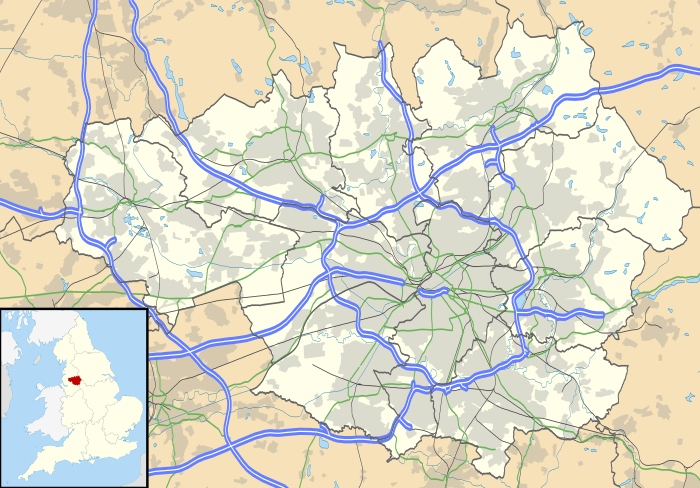Heald Green
Heald Green is a suburb of Stockport, Greater Manchester, England. In the south-west of the borough near Manchester Airport, it is bordered by Gatley and Cheadle to the north, Cheadle Hulme to the east, Handforth and Styal to the south and Wythenshawe to the west.
| Heald Green | |
|---|---|
 Heald Green Location within Greater Manchester | |
| Area | 4.41 km2 (1.70 sq mi) |
| Population | 12,640 |
| • Density | 2,866/km2 (7,420/sq mi) |
| Metropolitan borough | |
| Metropolitan county | |
| Region | |
| Country | England |
| Sovereign state | United Kingdom |
| Post town | Cheadle |
| Postcode district | SK8 |
| Dialling code | 0161 |
| Police | Greater Manchester |
| Fire | Greater Manchester |
| Ambulance | North West |
| UK Parliament | |
Heald Green railway station is on the Styal Line and is linked by a spur to Manchester Airport.
Population
At the 2001 Census, Heald Green had a population of 12,640, of whom 6,520 (51.6%) were female and 6,120 (48.4%) male, 2,494 (19.7%) aged 16 and under and 2,409 (19.1%) aged 65 and over.[1][2]
| Heald Green compared | |||
|---|---|---|---|
| 2001 UK Census | Heald Green | Stockport | England |
| Total population | 12,640 | 284,528 | 49,138,831 |
| White | 90.5% | 95.7% | 90.9% |
| Asian | 7% | 2.1% | 4.6% |
| Black | 0.4% | 0.4% | 2.3% |
Ethnicity
Ethnic white groups (British, Irish, other) account for 90.4% (11,440 people) of the population, with 9.6% (1200 people) being in ethnic groups other than white. Of the 9.6% (1200 people) in non-white ethnic groups:
- 144 (12%) belonged to mixed ethnic groups
- 881 (73.4%) were Asian or Asian British
- 47 (3.9%) were Black or Black British
- 128 (10.7%) were Chinese or other ethnic groups [3]
Religion
- Christian – 77.1% (9,741 people)
- Buddhist – 0.2% (23 people)
- Hindu – 1% (126 people)
- Jewish – 0.8% (106 people)
- Muslim – 6.1% (770 people)
- Sikh – 0.2% (20 people)
- Other religions – 0.3% (43 people)
- No religion – 8.3% (1,089 people)
- Religion not stated – 5.7% (722 people)[4]
Notable people
Famous residents have included world snooker champion Alex Higgins, Lancashire cricket players Johnny Briggs and Clive Lloyd, Sarah Harding from Girls Aloud, Coronation Street's Simon Gregson, Manchester City players Paul Dickov and Derek Jeffries and 1990s band Northern Uproar.
References
- http://neighbourhood.statistics.gov.uk/dissemination/LeadTableView.do?a=7&b=6174296&c=HEALD+GREEN&d=14&e=16&g=354842&i=1001x1003x1004&m=0&r=1&s=1310738547607&enc=1&dsFamilyId=75
- http://neighbourhood.statistics.gov.uk/dissemination/LeadTableView.do?a=7&b=6174296&c=HEALD+GREEN&d=14&e=16&g=354842&i=1001x1003x1004&m=0&r=1&s=1310738547591&enc=1&dsFamilyId=91
- http://neighbourhood.statistics.gov.uk/dissemination/LeadTableView.do?a=7&b=6174296&c=HEALD+GREEN&d=14&e=16&g=354842&i=1001x1003x1004&m=0&r=1&s=1310738547607&enc=1&dsFamilyId=87
- http://neighbourhood.statistics.gov.uk/dissemination/LeadTableView.do?a=7&b=6174296&c=HEALD+GREEN&d=14&e=16&g=354842&i=1001x1003x1004&m=0&r=1&s=1310738547623&enc=1&dsFamilyId=95